Pipe Making
The Pipe Making subsection of Pipedia serves as the Wiki home of the PipemakersForum.com. Much of what appears here is gleaned from the Forum. We highly recommend reading and participation in the forum in addition to reading and contributing here.
New pipe makers will find these two charts helpful. Classic pipe shapes, by Bill Burney: Pipe Shapes. And pipe parts along with their names, also by Bill Burney, see Pipe Parts.
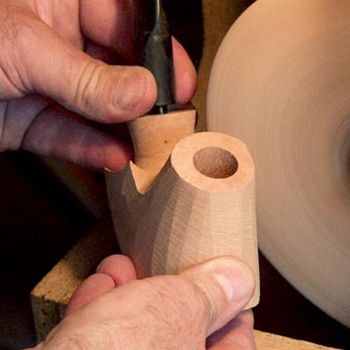
I love this site cheap hotel ticket cheap hotel rooms last minute 808561
Hello good day deigo nationwide cheap hotels nxbzu
Very funny pictures rooms cheapest hotel in paris ulpq
this post is fantastic hotel bookings cheap hotel weekly rates 265860
perfect design thanks heathrow cheap hotel in malaga :-PP
Tooling
Machines
Machines can be a huge asset while making pipes. Each pipe maker finds and refines their own methods, so the machines used vary greatly, but the following types of machines are common to professional and serious amateur pipe makers.
Wood Lathe | Drill Press | Metal Lathe | Band Saw | Dremel | Belt Sander | Disk Sander | Buffer
Hand Tools
In addition to the hand tools listed in the Basic Tools section, most professional and serious amateur pipe makers will want to acquire the following:
Tools for stamping or marking
Custom made stamp with name and/or logo: Most US pipe makers are using Paul at A&M steel stamps. He has made something of a specialty out of supplying pipe makers. The angles of the steel he uses is designed for wood and will cut cleaner than generic stamps.
A & M Steel Stamps 55 Windsor Ave, Mineola, N.Y. 11501 Phone: 516-741-6223 E-mail: mailto:amsteelstamps@yahoo.com
A set of generic 1/16" to 1/8" letter and number stamps is also helpful. 3/32" may be the ideal size, but is more difficult to find, and more expensive. Harbor freight sometimes has the 1/16" set and almost always has the 1/8" stamp set stamps. Brownells has 1/16", 3/32", and an interesting looking stamp guide.
Drills and Bits
This section and it's sub-sections are in the very early stages of development, please feel free to dive in! I had to leave them before finishing. We need photo examples of the options listed.
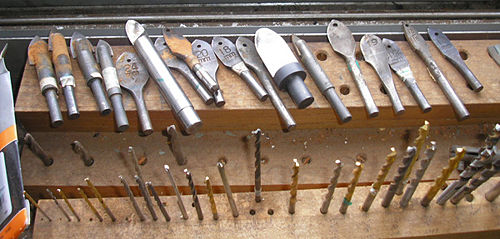
You just can't have too many options when it comes to drills and bits, or I guess any other tooling! Pipe making requires a combination of specialty or customized bits, and off-the-shelf drills. Even the off-the-shelf drills used are sometimes hard to find locally and must be ordered.
Chamber Bits
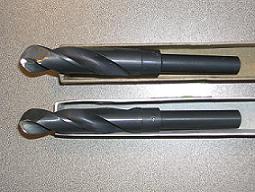
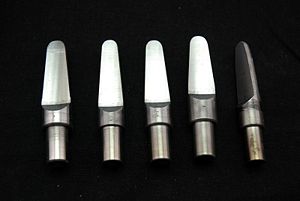
This is a huge subject, and one that should perhaps split off into it's own article. Pipe makers use a variety of tobacco chamber bits, depending on the machines and techniques used. The three major categories are:
- Spade type bits that have been specially ground are the easiest to acquire. They are inexpensive, and easy to make yourself by modifying off the shelf spade bits. Pimo Pipecraft and J.H. Lowe both make modified spoon bits.
- Silver and Deming (S&D) drills can also by specially ground for use as chamber bits. They tend to cut cleaner and faster than the modified spade tip bits. While possible to grind yourself, it is more difficult. Custom ground bits can be ordered, but they are considerably more costly than the modified spade bits. Ken Lamb, and Trent Rudat both make modified S&D bits.
- Customized tobacco chamber bits that resemble spoon bits are used by many of the Danish pipe makers, and are now being used by many others. These are nearly essential for the shape first method that involves holding the previously shaped stummel in ones hands, and pushing it into the spinning bit. They can be difficult to get. PiaPipes (Tom Eltang) has them on their Website. In the past, Brad Pohlmann a highly skilled machinist and pipe maker also made a batch of excellent chamber bits in this style.
Drills for mortise and draught holes
Many pipes makers are using a 5/16" mortise, and a 5/32" draught hole, but will vary this according to the design of the pipe. The types of bit used vary depending on the technique employed and if the mortise is drilled before or after the draught hole. Options include:
- Brad or Spur tip wood bits. These work best when the mortise is drilled before the draught hole, or have fresh wood to center the spur, otherwise they can be pulled off course. In fresh wood, they track very well and produce a relatively flat hole (with a point at the bottom from the spur), the flatness facilitates a precise fit with the stem tenon, while the spur point in the center of the hole can also provide an excellent start for centering the bit used to drill the draught hole.
- Standard Silver&Deming bits work great too, especially if you're following a previously drilled draught hole. The main drawback is that the end of your tenon will need to be tapered to match the bottom of the mortise.
- Forstner bits are an excellent choice. They leave a nice flat hole with clean sides. They're accurate and will not tend to follow grain or a previously drilled hole.
Forstner bits
Forstner bits, named after their inventor, Benjamin Forstner, bore precise, flat-bottomed holes in wood, in any orientation with respect to the wood grain. They can cut on the edge of a block of wood, and can cut overlapping holes.[1] In pipe making Forstner bits are often used for facing operations while making shanks and stems, and can also be used for facing the top of the bowl. Many pipe makers also use them for drilling the mortise, providing a smooth flat bottomed hole that facilitates a precise tenon to mortise fit.
You will find cheap sets of Forstner bits abound in discount stores, but these are not accurate enough for shank and stem facing work, where precision ground bits can make all the difference in facilitating a flush fit. Respected brands include Freud, Famag, Fisch (there are many others). The important thing to look for is "precision ground" bits, and avoid the cheap sets.
Drills for stems
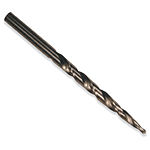
6" long taper point drills are an excellent choice for drilling out stem rod. 4mm, 5/32", and 9/64", and 1/8" are popular choices, depending on design preferences.
The taper point drill is stopped around 3/4" short of the bit end and followed up with a smaller straight bit that will facilitate thinning the stem at the bit for maximum comfort and aesthetics. Popular choices for this are HSS S&D bits in 1/16", or 2mm diameters, with some pipe makers going as small as 1 mm. 6" long "aircraft bits" enable this portion to be drilled from the same end as the rest of the air hole, or the rod stock can be flipped around and drilled from the other end with a shorter bit so long as proper alignment can be achieved with a self centering chuck or vice.
Other helpful bits
- Because they are short and very robust, machinist's centers or small countersinks of various diameters are very helpful for starting holes accurately in stems and stummels.
- Countersinks can be helpful for beveling the edge of the mortise, and larger ones can facilitate beveling the tobacco chamber in certain designs.
Materials and Supplies
CHINA
Mindong: Briar; Bamboo; Horn.
DENMARK
P.E.Hermann: Assorted Pipemaking Supplies.
Pia Pipes: Spoon bits, assorted briar blocks and stems (Tom Eltang)
GERMANY
Dan Pipe: Pipe Kits; Briar; Preformed stems, Ebonite rod, Assorted finishing supplies.
Marco Janzen - Hermann von Appen: Assorted Pipemaking Supplies.
SEM: Ebonite Rod
GREECE
Alexander Briar Pipes: Greek Briar
Amadeus Pipes: Greek Briar
ITALY
Volontà Anselmo a.s.: Ebonite Rod
Romeo Briar: Italian Briar
Calabria Pipe: Italian Briar
La Radica Srl: Italian Briar
SPAIN
Jaume Hom: Spanish Briar
Jean Pierre Soler: Spanish Briar
USA
J.H.Lowe: owned & operated by Tim West: Briar; Pipe Kits; Rod - Vulcanite & Acrylic/Lucite; Preformed Stems - Vulcanite & Acrylic/Lucite; Shank Repair Bands; Finishing Products - Buffs, Compounds, Abrasives, Stains, Wax; Machine Parts - Tenon Cutters, Arbors, Sanding Discs, Mortise Drill; Tools - Drills, Taps, Spade, Bits; Miscellaneous - Bone Screws, Delrin Tenons, Teflon Push Sets, Top Bowls, Bamboo, Calabash Bowls.
Briar Pipe Tooling: owned & operated by Trent Rudat: Lathe chuck jaws customized for pipemakers; Silver & Deming bits ground for tobacco chamber boring; Any custom tooling to your specifications & requirements.
Delvie's Plastics Inc.: Acrylic Rod for Stems; Buffing Wheels; Buffing Compounds; Buffing Machines.
Grizzly Industrial, Inc.: Buffing Wheels; Buffing Compounds; Buffing Machines; wood & metal working machines.
Jamestown Distributors: Taper Point Drill Bits; Abrasives.
Parks Pipes: Briar Blocks.
Pipe Makers Emporium: Algerian Briar; Preformed Stems - Ebonite, Cumberland & Acrylic/Lucite; Rod - German Vulcanite & Acrylic/Lucite; Finishing Products, Bands, Tennons, Stain, Tools, Motors. Everything for the Pipe Repair person and Carver.
GreatGoodsRUS: Briar
Vermont Freehand (eBay Store): Briar; Preformed Stems.
The American Smoking Pipe Co.: Briar; Preformed Stems.
E.A. Carey Predrilled Briar Pipe Kits
Masecraft Supply Company: Assorted Natural & Alternative Stem, stem insert, shank extension materials.
A & M Steel Stamps (custom stamp maker used by many US pipemakers): 55 Windsor Ave, Mineola, N.Y. 11501; Phone: 516-741-6223; E-mail: mailto:amsteelstamps@yahoo.com
MLCS Core Box and Round Nose bits for boring tobacco chamber.
Ken Lamb: Chucks, Bits, Cutters, etc.
Caswell: Buffing supplies.
McMaster-Carr Supply Co.: Huge general supply catalog, easy to find what you need & order, good prices on many items.
OnlineMetals.com: Delrin, stainless tubing, brass, etc...
The Great Industrial Garage Sale - eBay Store - Source for small pieces of black and white delrin - no minimum size purchase required.


